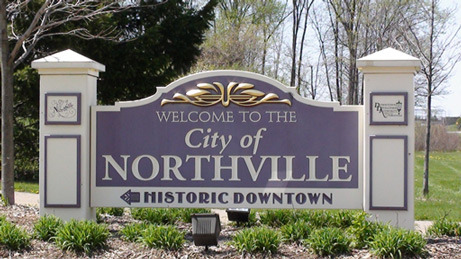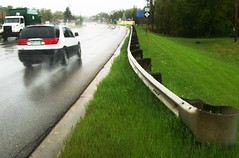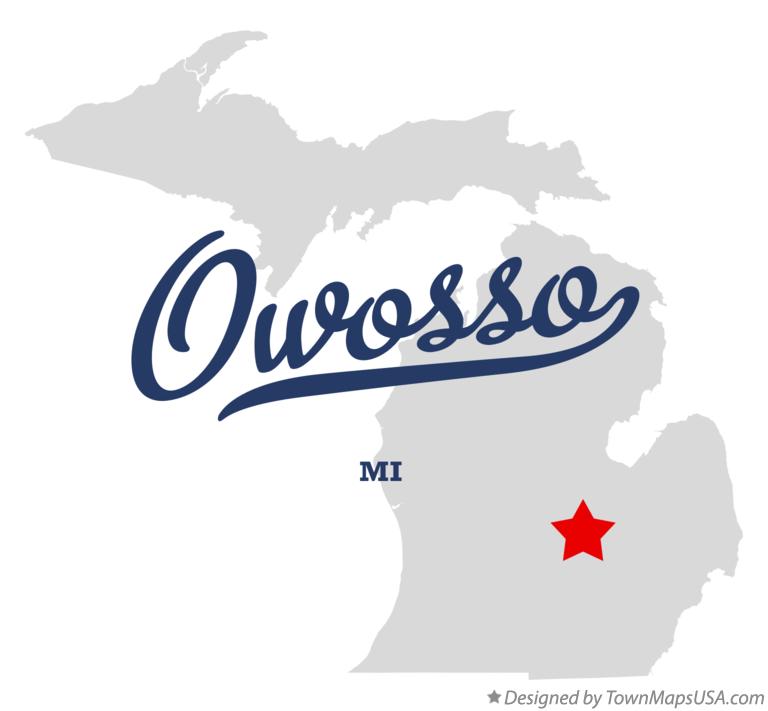You are currently browsing the monthly archive for June 2011.
FOR IMMEDIATE RELEASE via Disability Network/Lakeshore
 Otsego, MI. - On Monday night, planning commissioners in the City of Otsego listened to a presentation by Kathryn Gray, Public Policy Specialist for Disability Network/Lakeshore, regarding Complete Streets.
Otsego, MI. - On Monday night, planning commissioners in the City of Otsego listened to a presentation by Kathryn Gray, Public Policy Specialist for Disability Network/Lakeshore, regarding Complete Streets.
Complete Streets are achieved when local organizations and agencies routinely plan, design, construct, re-construct, operate, and maintain the transportation network to improve travel conditions for bicyclists, pedestrians, and people with disabilities in a manner consistent with, and supportive of, the surrounding community.
City Manager, Thad Beard, requested the presentation for the planning commission as an educational opportunity to learn about the benefits of Complete Streets and how Complete Streets would benefit the Otsego Community. Commissioners asked several questions in regards to further ensure the safety of citizens traveling through the M-89 corridor including those who are biking and walking.
Development of pedestrian, bicycle, and transit infrastructure offers long term cost savings, improved public health, economic development, a cleaner environment, reduced transportation costs, enhanced community connections, social equity, and more livable communities. Streets that support and invite multiple uses, including safe, active, and ample space are more conducive to public life and efficient movement of people than streets designed primarily to move automobiles.
Gray stated, “The City of Otsego has made several strides in moving towards a walkable and livable community. However, there is always more we can be doing as a city to create a sense of belonging which truly represents the citizens of our community. The City of Otsego’s dedication to an accessible and mobile community in which all ages and users are welcomed is extremely important. Because of this dedication, Complete Streets is a perfect fit for the Otsego community.”
The planning commission would like to form a committee of community stakeholders to further explore the idea of Complete Streets and the potential of creating a resolution in support of Complete Streets for the City of Otsego.
Over 40 Michigan communities have adopted a Complete Street ordinance or resolution.
For more information:
Kathryn Gray, Public Policy Specialist
Disability Network/Lakeshore
(616) 396-5326
[email protected]
Reported by Paul Lamoureux, Northville Resident

With unanimous accord, the Northville City Council adopted a complete streets resolution at its regular meeting on Monday, June 20. The measure was hailed by its author and initial proponent, City Manger Patrick Sullivan, as a necessary first step toward the establishment of a comprehensive non-motorized master plan designed to link Northville residents with nearby communities of Novi and Plymouth. It turns out Mr. Sullivan has prior, job-related experience with non-motorized infrastructure and has experienced first hand the positive community and economic benefits when a community accommodates all modes of transportation.
Several interesting facts emerged during the discussion of the resolution. Novi, with its own complete streets resolution, was cited as an example of a community benefiting from its long-standing non-motorized plan whose residents have long sought better access to commercial downtown Northville. Residents of both communities also seek a method to bike and walk to nearby Maybury State Park, a presently unsupported route and primary goal for the future. Finally, some expressed support for a better, biker-friendly connection between downtown Northville and Hines Park terminating at the city’s southern border.
A pair of Northville resident League of Michigan Bicyclists (LMB) members first approached the City Manager just a few short months ago to communicate the complete streets message. The city then availed itself of the resources provided by micompletestreets.org and the Michigan Municipal League. Upon passage of the resolution, City Council expressed their interest in further support from LMB in the drafting and implementation of the non-motorized master plan and expressed their gratitude for their leadership thus far in the process.
NOTE: The following is an excerpt from an article by Michelle Meunier that originally appeared in AnnArbor.com on 6/25/11. For the full article, please click here.
The Michigan Complete Streets Coalition would like to congratulate James, Katie and Conor for their continued success in advancing complete streets in Michigan. In addition to this new recognition by Senate Majority Leader Randy Richardville, the students also were recently honored in front of Saline City Council by Mayor Driskell, in addition to being recognized by the League of Michigan Bicyclists as Bicycle Advocates of the Year at our 2011 Michigan Bicycle Summit.

Katie Birchmeier, James Kleimola (back) and Conor Waterman speak with Senate Majority Leader Randy Richardville.
For James Kleimola, riding his bike around Ypsilanti gives him a sense of independence.
Kleimola, along with 10-year-olds Conor Waterman and Katie Birchmeier, both of Saline, were recognized June 22 by the Michigan Legislature as state advocates of the year for their work in making streets safer for bicyclists.
These three youths are students of programs to educate all cyclists, PEAC, and testified in front of the Michigan House and Senate Transportation committees along with the Disability Caucus to help support the Michigan Complete Streets legislation in 2010.
John Waterman, executive director of PEAC said that Complete Streets has to do with road access issues.
“A lot of times we’re designing roads with just cars in mind, but there are individuals like these three that won’t have the opportunity to use cars,” he said. “Looking at our streets for all users we’re really using our public dollars to fund so everyone has access to our community, which is so so important.”
Read the rest of this article in AnnArbor.com
 As a follow-up to the Action Alert we posted in late April regarding the Michigan budget process, we wanted to update our supporters on the finalized budget in regards to complete streets and public transit funding.
As a follow-up to the Action Alert we posted in late April regarding the Michigan budget process, we wanted to update our supporters on the finalized budget in regards to complete streets and public transit funding.
The House version of the budget ultimately reduced bus operating and bus capital by $20 million, however the final version that came out of conference committee restored funding for public transportation to current year levels. We are extremely pleased to see that the House and Senate came together to recognize the vital importance of funding public transportation in Michigan.
The complete streets boilerplate language did not fare so well, however. Unfortunately, while the Senate version of the budget included the complete streets boilerplate language, which gave Transportation Enhancement (TE) funding preference to communities with complete streets policies, the final version lacked such language.
The TE program is a competitive grant program that funds projects such as nonmotorized paths, streetscapes, and historic preservation of transportation facilities, that enhance Michigan’s intermodal transportation system and improve the quality of life for Michigan citizens.
The TE incentive language, which was successfully included in last year’s budget, helped encourage over 25 communities in Michigan to adopt complete streets resolutions and ordinances in the past year alone. We are extremely disappointed that this incentive language, which did not cost anything, was removed from the bill.
We are pleased to report, however, that the Michigan Department of Transportation (MDOT), who administers TE funding, has verbally indicated that they will continue to give TE priority to communities with complete streets ordinances and resolutions despite this language being stripped out of the budget bill.
Having received numerous inquires regarding the subject of TE priority going to communities with complete streets policies; we recently requested further clarification from MDOT about how they implement this preference. The Department has explained to us that basically all things being equal in the applications between two communities applying for TE dollars, a community that has shown a true commitment to complete streets would have the more competitive TE project.
This does beg the question of how often communities actually submit truly identical applications. MDOT went on to explain that a community with a competitive project, a complete streets resolution, policy, or ordinance, and a robust public input process that engages all users of the system will have a better chance to secure TE funding than a community that does not develop projects on a good complete streets foundation. “There is no guarantee of funds, but complete streets is good for the community and it improves your chances for a successful application,” said Amber Thelen, MDOT’s TE Program Manager.
MDOT’s Project Competitiveness Details document, available on the TE Program website, specifically references complete streets in two places under the heading “What other factors make a project competitive for TE funding?”:
- project identified as a result of a community’s Complete Streets stakeholder involvement Process
- projects supporting a community’s Complete Streets policy, or is part of a statewide initiative such as Cool Cities, Cities of Promise, the Safe Routes to School Program, Heritage Route or Scenic Byways Program
They stressed that regardless if a community has passed a resolution or ordinance, their primary concern is whether or not the community can demonstrate a true commitment to the principles of complete streets in how they approach transportation projects. In addition, MDOT encouraged communities with questions or who have a potential project idea, to contact a TE Grant Coordinator who are available to assist communities by providing more information on the program, guidance on competitive projects, and how to best develop a competitive application. Contact information is available www.michigan.gov/tea, under the “Contact Us” heading.
We will continue to share further details on this topic as they become available.
We would again like to thank all of our supporters who contacted their legislator to ask them to protect transit funding and the complete streets boilerplate language.
Marquette, Ludington, Lake Isabella, Acme Twp. and Owosso join the growing list of supportive communities!

A roadway in need of complete streets in Acme Township. (photo by glhjr)
While we have been a little behind in updating this site the past few weeks, it certainly doesn’t mean there hasn’t been news worth posting about complete streets in Michigan. In fact, we are pleased to report that there have been five complete streets resolutions adopted across the state recently.
On May 9th, both the Cities of Marquette and Ludington adopted complete streets resolutions at their respective City Council meetings. The Mining Journal and the Ludington Daily News both covered the passage of these resolutions.
We also received word this month from Lake Isabella Village Manager Tim Wolff that their Village Council also adopted a complete streets resolution.
As reported on My Wheels are Turning, Acme Township became the first community in Grand Traverse County to endorse Complete Streets at their June 7th Board of Trustees meeting. They join a handful of other townships across the state who have also recently adopted complete streets resolutions. While we are extremely encouraged by the action of these communities, it still remains to be seen what sort of impact these policies will ultimately have since county road commissions actually are the ones who have jurisdiction over roads within townships. Ultimately we hope that we are seeing the beginning of a fruitful dialog between Michigan’s 1200+ townships and the 80+ county road commissions.
It also looks like we might see more complete streets policies coming out of northern Michigan in the near future. According to the Petoskey News Northeast Michigan Council of Governments and Michigan Trails & Greenways Alliance are cooperating to offer complete streets training sessions in Emmet and Alpena Counties at the end of this month.
And lastly, as we reported yesterday, Owosso also recently adopted a complete streets resolution. This brings Michigan to a total of 38 known local resolutions and six ordinances in addition to our statewide law. According to Holly Madill, Complete Streets Project Coordinator for the Michigan Department of Community Health, approximately 2,659,080 people, 27% of Michigan’s population now lives in a community that has endorsed complete streets either through a resolution or ordinance.
View Resolutions:
 Reposted from Argus-Press.com
Reposted from Argus-Press.com
OWOSSO — The city council this week passed a resolution to support a “complete streets” initiative that promotes safe and efficient movement for vehicles, bicyclists and pedestrians while planning and designing roadway construction.
The resolution states, when feasible, the city will “incorporate the complete street design considerations as a routine part of infrastructure planning and implementation.”
The inclusion of infrastructure like bike lanes and additional easier-to-use crosswalks offers health benefits for the population and makes Owosso a more livable community, the resolution states.
The resolution also requires the Michigan Department of Transportation to consult with city officials when undergoing projects on state highways within the city limits. MDOT is not currently required to seek city input when doing work on state highways such as M-21 and M-52.
Council members expressed concern with MDOT and the lack of communication they had when work was done in the past.
City Manager Don Crawford said the city received notice from MDOT that the organization is requesting engineers to design M-21 west of M-52 and M-52 north of Main Street. He expects MDOT to award the design sometime in the near future.
How much consulting and how much consideration MDOT will give to local input was questioned by some council members.















